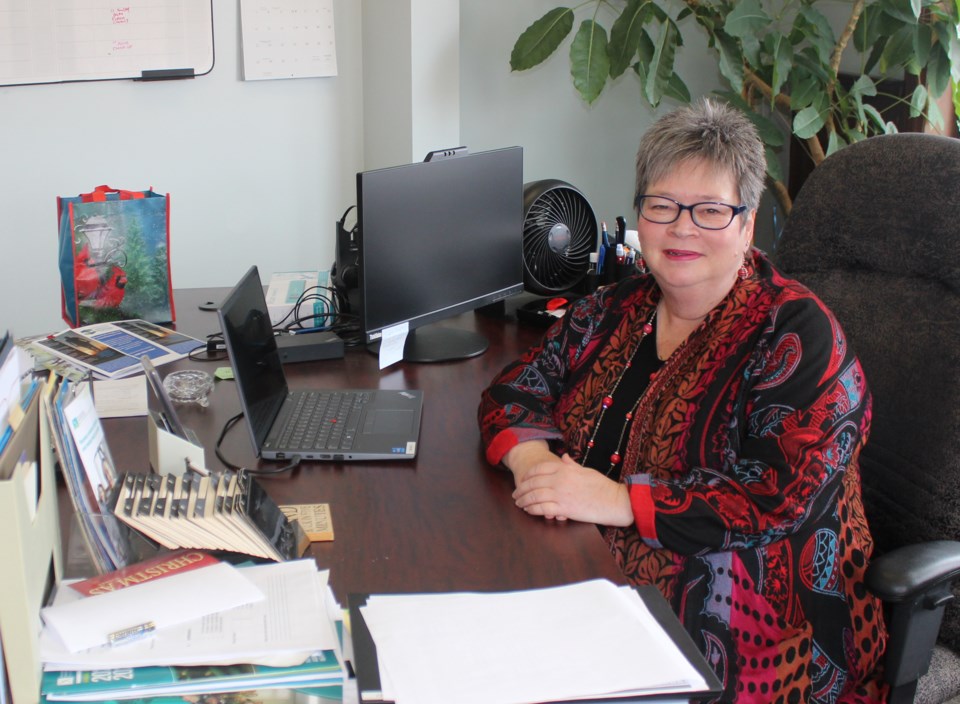It was almost a year ago when Catherine Hardman joined a room full of representatives from partner organizations, government officials and friends from the community to cut a ribbon to celebrate the merger of a pair of vital organizations.
Hardman was the choice for CEO after Choices for Change and Resilience Huron Perth merged into Canadian Mental Health Association (CMHA) Huron Perth Addiction and Mental Health Services.
"It has not been without its challenges," Hardman told StratfordToday on Friday.
"Whenever you are bringing two organizations together that have different cultures and operate differently and have different histories, there are challenges with that. But I think we have really been able to bring folks together over a common vision and values."
At its third floor main office on Downie Street, Hardman had a stack of flyers, hot off the presses, which expand on the organization's goals of recovery oriented addiction and mental health services. There is also a new website, staff phone numbers and a client management system, all part of integrating two separate organizations together.
Hardman said a new strategic plan has helped solidify the goals moving forward.
According to the organization's annual report, the strategic plan engaged community partners, clients, staff, leadership and the CMHA Huron Perth board of directors to "gather input on priorities for the next three years, based on the agency's evolution and the broader mental health and addictions landscape at the local, provincial and federal levels".
Hardman said the strategic plan was finalized in October.
"We really felt like that was a good way for everyone to understand where we are going."
Staff had significant input into the vision of the organization, she said.
"We felt it was important to us to have a direction and understand what the direction is and where we are going. Staff wellness and culture were our primary things for year one. We know it is foundational to the work we are doing and to the health of the organization."
The second priority within the strategic plan is continuing to be a leader in mental health and addictions.
"How do we continue to do that and continue to have conversations with our partners around growth of the system and the gaps and how do we work together around that?"
The third is around capacity and looking at services offered and how CMHA expands the services they are offering.
As an example, the organization currently offers addiction help for anyone age 12 and up. On the mental health side the minimum age is 16. Conversations with partners around opportunities to provide services in a different way are ongoing, Hardman said.
Hardman said in recent years and more so in the past year, clients are looking for help with a variety of life challenges.
"The complexity of our clients is like nothing we have seen. Especially those that are homeless or precariously housed. The longer they are on the street, the sicker they are getting. Our staff are doing really tough work. But it is getting more and more difficult."
Hardman said the organization carries about 105 staff members but other than replacing staff who have moved on, there have been no extra hires.
Clients looking for help often present with addiction and mental health challenges.
"The concurrent piece is pretty significant. We always had that but it is much more complex then it ever has been. It is multiple substances that people are using, typically, and really complex situations.
"We definitely need more crisis support. There is crisis support out of HPHA - they have two people on per shift...as a system that is where we need more capacity, as the crisis piece and being able to manage things as they come up."
Housing continues to be a big issue
Hardman said the CMHA is doing a lot of work with the homeless population. There needs to be a serious, concerted effort at all levels of government work on what is not longer just an urban issue anymore, she said.
"Something has to give. Unfortunately it is going to cost a lot of money but in the end it will save money because we are spending money on healthcare. We have to think about all levels of support including 24/7 support, because there are some people that need that."
Others need a lot of intensity in support initially but not as much as they get settled and get help, Hardman said.
Leaders in the health and housing sectors have to continue to work together because people can't focus on their addictions and/or mental health when they don't have a roof over their heads, Hardman noted.
"The housing first framework philosophy is what we all want to do but you can't do it if you don't have housing.
"We have to find solution. We can't keep going like this."
Hardman said there were successes to celebrate over a tough year. Staff came together from two separate organizations to work on complex issues. Hardman said they tried to bring physically bring staff together for learning and networking opportunities and to learn more about each other's work.
"We have a lot of expertise and experience and people are bringing that. We have been able to help a lot of people."
"We have housed people and kept people housed. Everyday we have successes with people overcoming addictions, getting their mental health stabilized. We are able to build that community...we are starting to be a team and understand what we can offer within the organization."



